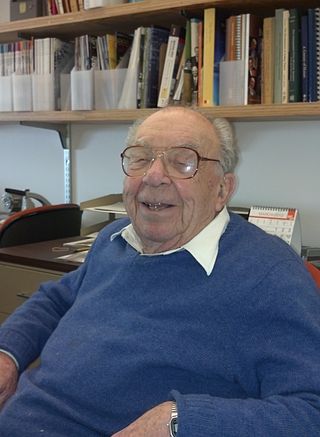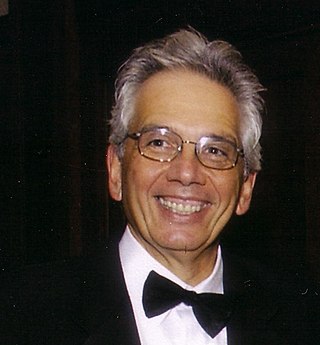
Nicholas F. Maxemchuk is an American electrical engineer.

Nicholas F. Maxemchuk is an American electrical engineer.
Maxemchuk graduated from the City College of New York in 1968 with a Bachelor of Engineering (Electrical), he received his master's degree in 1970 from the Moore School of Electrical Engineering at the University of Pennsylvania, and obtained his Doctor of Philosophy in Systems Engineering from the University of Pennsylvania in 1975. [1]
He served as a member of the technical staff at the David Sarnoff Research Center from 1968–1976, and Bell Labs from 1976–1984, where he subsequently served as head of distributed systems research Department (1984–1996) and technology leader (1996–2001). In 2001 he became full professor at Columbia University, and chief of research at IMDEA Networks Institute from 2008.
Maxemchuk was named IEEE Fellow in 1989 for contributions to Metropolitan and Local Area Networks, [2] and received the 2006 IEEE Koji Kobayashi Computers and Communications Award. [3]

Roberto Mario "Robert" Fano was an Italian-American computer scientist and professor of electrical engineering and computer science at the Massachusetts Institute of Technology. He became a student and working lab partner to Claude Shannon, whom he admired zealously and assisted in the early years of Information Theory.

Robert Gray Gallager is an American electrical engineer known for his work on information theory and communications networks.
John Nelson Warfield was an American systems scientist, who was professor and director of the Institute for Advanced Study in the Integrative Sciences (IASIS) at George Mason University, and president of the Systems, Man, and Cybernetics Society.
Fawwaz T. Ulaby is Arthur F. Thurnau Professor of Electrical Engineering and Computer Science at the University of Michigan in Ann Arbor and formerly the Founding Provost and Executive Vice President of the King Abdullah University of Science and Technology (KAUST) and R. Jamieson and Betty Williams Professor of Electrical Engineering and Computer Science at the University of Michigan.

George Harry Heilmeier was an American engineer, manager, and a pioneering contributor to liquid crystal displays (LCDs), for which he was inducted into the National Inventors Hall of Fame. Heilmeier's work is an IEEE Milestone.
Stewart David Personick is an American researcher in telecommunications and computer networking. He worked at Bell Labs, TRW, and Bellcore, researching optical fiber receiver design, propagation in multi-mode optical fibers, time-domain reflectometry, and the end-to-end modeling of fiber-optic communication systems.
Debasis Mitra is an Indian-American mathematician, known for his numerous contributions to the theory of communication systems, control theory and queueing theory.

Asad Ali Abidi is a Pakistani-American electrical engineer. He serves as a tenured professor at University of California, Los Angeles, and is the inaugural holder of the Abdus Salam Chair at the Lahore University of Management Sciences (LUMS). He is best known for pioneering RF CMOS technology during the late 1980s to early 1990s. As of 2008, the radio transceivers in all wireless networking devices and modern mobile phones are mass-produced as RF CMOS devices.

Vijay K. Bhargava is a researcher and Professor in the Department of Electrical and Computer Engineering at the University of British Columbia (UBC). He served the department as its Head for 5 years. Before moving to UBC, Bhargava was a Professor in the Department of Electrical and Computer Engineering at University of Victoria.
Norman Charles Joseph Beaulieu is a Canadian engineer and former professor in the ECE department of the University of Alberta.

Dimitri Panteli Bertsekas is an applied mathematician, electrical engineer, and computer scientist, a McAfee Professor at the Department of Electrical Engineering and Computer Science in School of Engineering at the Massachusetts Institute of Technology (MIT), Cambridge, Massachusetts, and also a Fulton Professor of Computational Decision Making at Arizona State University, Tempe.
Simon Haykin is an electrical engineer noted for his pioneering work in Adaptive Signal Processing with emphasis on applications to Radar Engineering and Telecom Technology. He is currently Distinguished University Professor at McMaster University in Hamilton, Ontario, Canada.
Chen Wen-tsuen is an ethnic Taiwanese computer scientist, a distinguished research fellow at the Academia Sinica and a lifelong national chair of the Ministry of Education, Taiwan. From 2006 to 2010, he was the president of the National Tsing Hua University, a premier research university in Taiwan.
Mischa Schwartz is the Charles Batchelor Professor Emeritus of Electrical Engineering at Columbia University, which he joined in 1974 as professor of electrical engineering and computer science. He received the B.E.E. degree from the Cooper Union, New York, NY, in 1947, the M.E.E. degree from the Polytechnic Institute in 1949, and the Ph.D. degree in applied physics from Harvard University under the supervision of Philippe Le Corbeiller in 1951. He was the founding director of the NSF-sponsored Center for Telecommunications Research (CTR). He is a Life Fellow of the IEEE, and a Fellow of the AAAS. In 1992, he was elected a member of the US National Academy of Engineering for leadership in engineering education in the field of communications. He is also a past president of the IEEE Communications Society, and a former Director of the IEEE.
Keith W. Ross is an American scholar of computer science whose research has focused on Markov decision processes, queuing theory, computer networks, peer-to-peer networks, Internet privacy, social networks, and deep reinforcement learning. He is the Dean of Engineering and Computer Science at NYU Shanghai and a computer science professor at the New York University Tandon School of Engineering.
Jianwei Huang is a Chinese computer scientist and electrical engineer. He is a Presidential Chair Professor and Associate Vice President of The Chinese University of Hong Kong, Shenzhen. He is also an Adjunct Professor in the Department of Information Engineering at the Chinese University of Hong Kong. He is a guest professor of Southeast University.

Bruce Edward Hajek is a Professor in the Coordinated Science Laboratory, the head of the Department of Electrical and Computer Engineering, and the Leonard C. and Mary Lou Hoeft Chair in Engineering at the University of Illinois Urbana–Champaign. He does research in communication networking, auction theory, stochastic analysis, combinatorial optimization, machine learning, information theory, and bioinformatics.

Richard D. Gitlin is an electrical engineer, inventor, research executive, and academic whose principal places of employment were Bell Labs and the University of South Florida (USF). He is known for his work on digital subscriber line (DSL), multi-code CDMA, and smart MIMO antenna technology all while at Bell Labs.
Neelesh B. Mehta is an Indian communications engineer, inventor and a professor at the Department of Electrical and Communications Engineering of the Indian Institute of Science who studies wireless networks.

Jeremiah F. Hayes was an award-winning North American professor of electrical engineering. In 1983, he was honored as an IEEE fellow for his first published book which was about computer communications. On that project, Hayes worked with Andrew Viterbi on combining Erlang (unit) with Shannon–Hartley theorem. He also co-authored a communications textbook entitled Digital Communications Principles with Stephen Weinstein and Richard D. Gitlin. He received the Canadian Award for Telecommunications Research in 1996, and was a senior editor of the Journal on Selected Areas in Communications (JSAC). His most noted work was subgroup polling. Jeremiah Francis Hayes was born on July 8, 1934, in New York NY, and died on May 8, 2018, in Victoria BC, Canada.